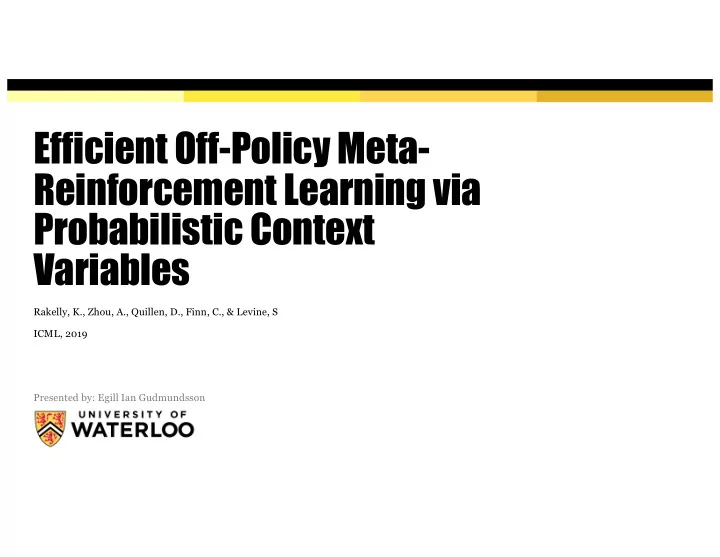

Efficient Off-Policy Meta- Reinforcement Learning via Probabilistic Context Variables Rakelly, K., Zhou, A., Quillen, D., Finn, C., & Levine, S ICML, 2019 Presented by: Egill Ian Gudmundsson
Some Terminology On-policy learning: Only one policy used throughout the system to both ▪ explore and select actions. Not optimal because policy covers exploration as well, but less costly. Efficient Off-Policy Meta-Reinforcement Learning via Probabilistic Context PAGE 2 Variables
Some Terminology Off-policy learning: Two policies, one for exploring and the other for action ▪ selection. Expensive computationally, but more optimal solution achieved with fewer samples. Informs Target Policy Behaviour Policy (Exploitation) (Exploration) Efficient Off-Policy Meta-Reinforcement Learning via Probabilistic Context PAGE 3 Variables
Some Terminology Meta-Reinforcement Learning: First train a reinforcement learning system ▪ to do a task, then train it to do a second different task The hope is that some of its ability to do the first will help it learn how to do the ▪ second I.e. we will converge faster on a solution for the second using knowledge from the ▪ first If this happens, it is called meta-learning. Learning how to learn. ▪ Depending on the system, pre-training can be meta-learning ▪ Efficient Off-Policy Meta-Reinforcement Learning via Probabilistic Context PAGE 4 Variables
Problem Definition Most meta-learning RL systems use on-policy learning ▪ The general problem with on-policy learning is sample inefficiency ▪ There is meta-training efficiency for other tasks and adaptation efficiency ▪ for the task at hand Ideally, both should be good. That is, we want few-shot learning. ▪ Current methods would use off-policy during training and then on-policy during ▪ inference. But this might lead to overfitting in off-policy methods (different real data). How can current solutions be improved? The authors propose Probabilistic ▪ Efficient Off-Policy Meta-Reinforcement Learning via Probabilistic Context PAGE 5 Variables Embeddings for Actor-critic RL ( PEARL )
PEARL Method We have a set of tasks T , each of which consists of an initial state distribution, ▪ initial transition distribution and initial reward function Each sample is a tuple referred to as a context c = ( s , a , r, s’ ) and each task has a ▪ set of size N these samples c 1: N Now for the innovative bit: A latent (hidden) probabilistic context variable Z is ▪ added to the mix and the policy is conditioned with this variable as π θ ( a | s , z ) while learning a task A soft actor-critic (SAC) method is used in addition to Z ▪ Efficient Off-Policy Meta-Reinforcement Learning via Probabilistic Context PAGE 6 Variables
The Z Variable How do we ensure that Z captures meta-learning properties and not other ▪ dependencies? An inference network q ( z | c ) is trained during the meta-training phase to ▪ estimate p( z | c ). To sidestep the intractability, the lower bound is used for optimization Optimization is now model-free using evidence lower bound (ELBO) ▪ Reward from task Informational objective bottleneck Use Gaussian factors to lessen impact of context size and order (permutation ▪ Efficient Off-Policy Meta-Reinforcement Learning via Probabilistic Context PAGE 7 Variables invariant)
The Inherent Stochasticity of Z The variable Z can be said to learn the uncertainty of the tasks that it is presented ▪ with, a bit similar to the beta functions in Thompson sampling Due to the policy relying on z to reach a decision, there is a degree of uncertainty ▪ that becomes less and less as the model learns more This initial uncertainty seems to be enough to get the model to explore in the new ▪ task, but not so much to prevent optimal convergence Efficient Off-Policy Meta-Reinforcement Learning via Probabilistic Context PAGE 8 Variables
Soft Actor-Critic Part The optimal off-policy model for this method was found to be SAC with the ▪ following loss functions: Efficient Off-Policy Meta-Reinforcement Learning via Probabilistic Context PAGE 9 Variables
Pseudocode Fill our buffers with relevant data for the task Sample using actor-critic and utilize z Update weights Efficient Off-Policy Meta-Reinforcement Learning via Probabilistic Context PAGE 10 Variables
Tasks The classic MuJoCo environment and tasks used ▪ Efficient Off-Policy Meta-Reinforcement Learning via Probabilistic Context PAGE 11 Variables
Meta-Training Results Efficient Off-Policy Meta-Reinforcement Learning via Probabilistic Context PAGE 12 Variables
Meta-Training Results, Further Time Steps Efficient Off-Policy Meta-Reinforcement Learning via Probabilistic Context PAGE 13 Variables
Adaptation Efficiency Example Efficient Off-Policy Meta-Reinforcement Learning via Probabilistic Context PAGE 14 Variables
Anything Missing? Drastically improves meta-learning capabilities ▪ Shows that off-policy methods are usable in these circumstances ▪ Ablation shows that the benefits are thanks to the changes suggested ▪ All of these tasks are fairly similar. What about meta-training on a disparate set ▪ of tasks? Is there still an advantage? Most of the results are about the meta-learning step. What about adaptation ▪ efficiency in general? Efficient Off-Policy Meta-Reinforcement Learning via Probabilistic Context PAGE 15 Variables
References Rakelly et al., Efficient Off-Policy Meta-Reinforcement Learning via Probabilistic ▪ Context Variables, https://arxiv.org/pdf/1903.08254.pdf Vinyals et al., Matching Networks for One Shot Learning, ▪ https://arxiv.org/pdf/1606.04080.pdf Kingma & Welling, Auto-Encoding Variational Bayes, ▪ https://arxiv.org/pdf/1312.6114.pdf Haarnoja et al., Soft Actor-Critic: Off-Policy Maximum Entropy Deep ▪ Reinforcement Learning with a Stochastic Actor, https://arxiv.org/pdf/1801.01290.pdf Efficient Off-Policy Meta-Reinforcement Learning via Probabilistic Context PAGE 16 Variables
Recommend
More recommend